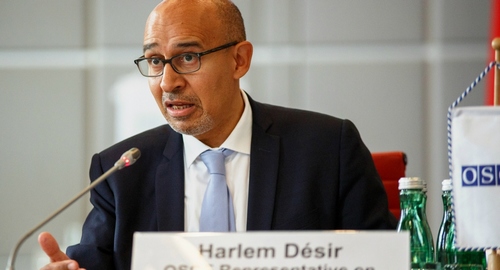New law on World War II crimes in Poland can threaten freedom of expression, says OSCE Representative Désir
The OSCE Representative on Freedom of the Media Harlem Désir, on February 1st, expressed his concern about a law criminalizing statements on historical events, such as accusations against Poland or Polish people of complicity in crimes committed during the Holocaust or denial of crimes against the Polish population committed by Ukrainian nationalists, such as the Volyn Massacre during World War II.

Harlem Désir, OSCE Representative on Freedom of the Media , speaking at the opening of the Internet Freedom Conference, 13 October 2017, Vienna.
The law will set fines or a maximum three year jail term in particular for anyone who refers to Nazi death camps as Polish or accuses Poland of complicity.
“I have serious concerns about the law, which criminalizes speech in historical matters,” the Representative said. “Though we all know the sensitivities around historical events, freedom of expression is of particular importance for historians and academics. History is a matter of independent academic research and of free discussion, not of judiciary decision. The law should be rejected as a disproportionate restriction of freedom of expression. Only when statements constitute incitement to violence or discrimination could they be criminalized,” said Désir.
The Representative recalled that in its authoritative interpretation of Article 19 of the International Covenant on Civil and Political Rights (“ICCPR”), General Comment No 34, the UN Human Rights Committee has stated clearly that “laws that penalize the expression of opinions about historical facts are incompatible” with international obligations on freedom of expression under Article 19. Furthermore, the ICCPR “does not permit general prohibition of expressions of an erroneous opinion or an incorrect interpretation of past events”.
To enter into force, the law would still need to be enacted by the country’s president. “I hope that to protect freedom of expression the law will be vetoed by the president,” said Désir.
The OSCE Representative on Freedom of the Media observes media developments in all 57 OSCE participating States. He provides early warning on violations of freedom of expression and media freedom and promotes full compliance with OSCE media freedom commitments.
Source: Organization for Security and Co-operation in Europe
- 399 reads
Human Rights
Ringing FOWPAL’s Peace Bell for the World:Nobel Peace Prize Laureates’ Visions and Actions

Protecting the World’s Cultural Diversity for a Sustainable Future

The Peace Bell Resonates at the 27th Eurasian Economic Summit

Declaration of World Day of the Power of Hope Endorsed by People in 158 Nations

Puppet Show I International Friendship Day 2020

